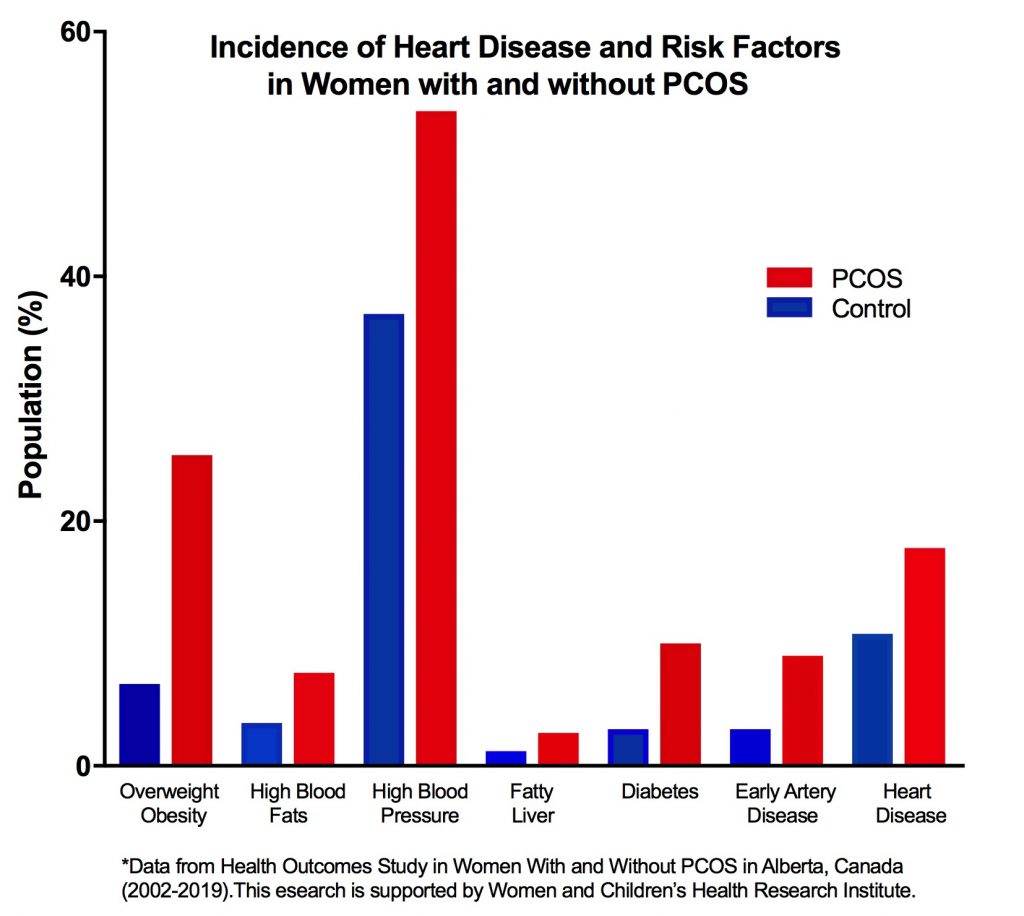Health outcomes in women with and without PCOS
Background
In Canada and globally PCOS is the most common metabolic-endocrine disorder affecting 15% of adolescents and women of reproductive age. Recent population studies have shown women with PCOS have a 4-fold and 2-fold higher incidence of Type-2 Diabetes (T2D) and cardiovascular disease (CVD), respectively. In Alberta, we have preliminary epidemiological data showing women with PCOS have a 3-fold and 2-fold higher incidence of T2D and CVD (Figure 1). We also have preliminary data showing that these women have increased incidence of other adverse health outcomes including respiratory disorders and mental health. This data is alarming and we urgently need to determine these health outcomes and related morbidity and mortality in high-risk women with PCOS in Alberta.
T2D and CVD risk in PCOS
Women with PCOS have increased global risk of T2D and CVD based on risk factors of increased body weight and altered blood glucose and fat metabolism. Cardiometabolic complications in PCOS are a major public health concern as these women have a 4-fold and 2-fold greater risk of transitioning to develop T2D and premature CVD, respectively. Meta-analyses have shown post-menopausal women with PCOS have double the risk of end-stage, non-fatal or fatal cardiovascular ischemic events and this is often associated with the co-morbidity of T2D. Large population studies provide evidence of increased mortality in individuals with premature onset of T2D, and this is primarily associated with ischemic-CVD events. Population studies have also shown the mean age of onset of T2D in PCOS is approximately 5-10 years younger (20-30 years of age) compared to the general population. Furthermore, 1 in 5 women with PCOS develop T2D before the age of 40. Our preliminary research in collaboration with AbSPORU shows women aged 18-45 years have a 3-fold higher incidence of obesity and T2D in PCOS compared to aged matched controls. The significance of the increased prevalence and potential earlier age of onset in T2D is that T2D is known to exacerbate premature CVD risk in women with PCOS. In addition, adolescents and women with PCOS have lifelong co-morbidities that impact their daily lives and also their mental health. At present we need to validate and quantify the health outcomes of women with PCOS compared to those without PCOS in the Alberta health care system. This evidence will help us to develop a framework to develop guidelines to improve health outcomes in women with PCOS.
Aim
The primary aim of this study is to determine the incidence of T2D, CVD and associated cardiometabolic risk factors, and to determine the morbidity and mortality outcomes in women with PCOS in the Alberta health care system. The overarching long term vision is to deliver better care, timely care and the right care to women with PCOS to prevent T2D and CVD risk, and address other health outcomes. At this time there is an urgent need to determine health outcomes in women with PCOS compared to those without PCOS in the Canadian population.
Principle Research Questions
What is the incidence of T2D and CVD and associated cardiometabolic risk factors in women with and without PCOS in Alberta?
What are the major health outcomes of morbidity and mortality in women with PCOS compared to those without PCOS in Alberta?
Primary Objective
To determine the incidence of T2D, CVD and cardiometabolic risk factors in women with PCOS, and the incidence of other morbidity and mortality outcomes in women with PCOS compared to those without PCOS in Alberta. evidence-based research to provide proof of principle and preliminary data to support a larger study to drive improvements in patient-centred and clinical care of this high-risk population. To determine the incidence of T2D, CVD and cardiometabolic risk factors in women with PCOS compared to those without PCOS in Alberta.
Outcomes
The outcomes of this work will help to provide evidence of health outcomes in women with PCOS and to form a platform to develop a framework for a pathway to improve clinical and patient-centred health care in women with PCOS.

Scientific Publications & Conference Proceedings

Title: Polycystic Ovary Syndrome: Increased Incidence of Cardiovascular Disease in a Canadian Population Cohort
Authors: M. Ghosh ∙ W. Ting ∙ J. Bakal ∙ P. Raggi ∙ H. Becher ∙ D. Vine
Published In: Canadian Journal of Cardiology (CJC). Poster Presentation Abstracts. Volume 39, Issue 5, Supplement S12-S13, May 2023
